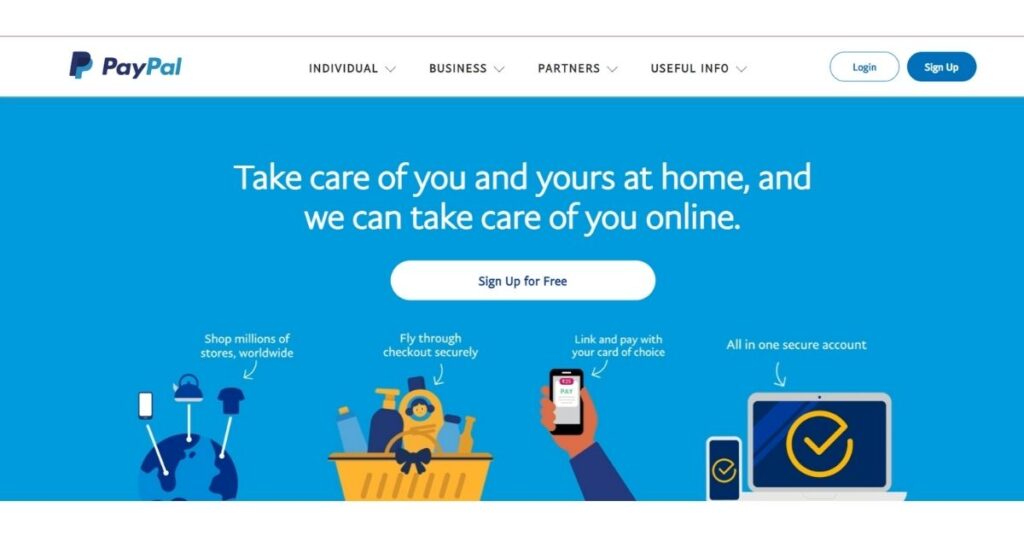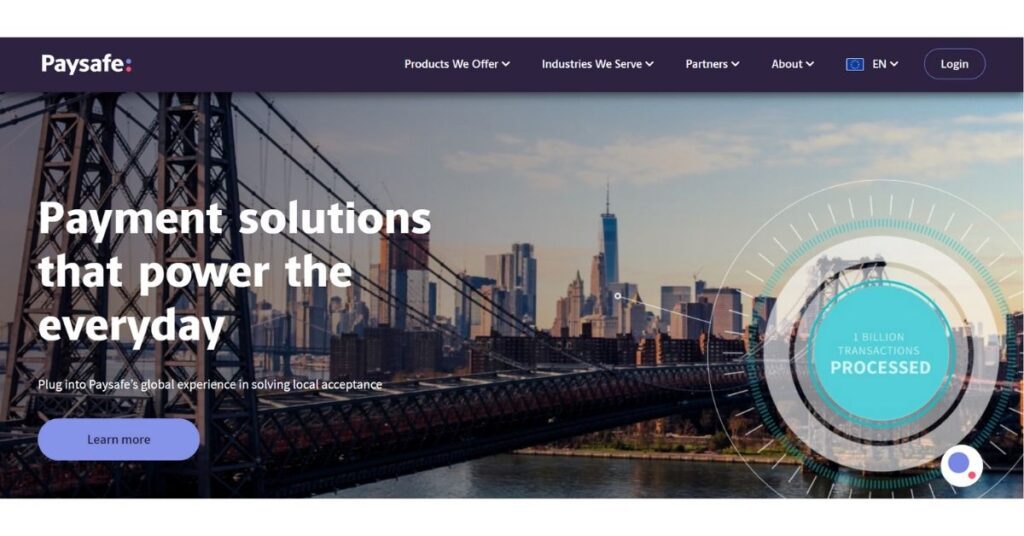Paysafe vs Paypal: Payment processing is the lifeblood of every company. Other sections of a firm become outdated without an efficient mechanism to process incoming cash flows. When you include inexpensive processing fees, it becomes increasingly difficult to make a profit. Paysafe and PayPal are two of the most popular merchant service providers. We are here to compare Paysafe vs PayPal.
While PayPal’s basic platform is primarily focused on consumer-to-consumer transactions, its payments pro service is better aligned with Paysafe’s business goals. Both Paysafe and PayPal offer reliable services and have a long track record.
Paysafe vs PayPal- comparison
When compared side by side, however, each company has its own set of strengths and drawbacks. Merchants and enterprises searching for a long-term payment processing solution should thoroughly research both services before committing to one.
Paysafe offers
Paysafe is a global payment processor that provides a variety of services for both online and offline companies, as well as saas platforms. Paysafe offers digital wallets through its skrill and Neteller brands in addition to more traditional merchant services.
All major credit cards are accepted on Paysafe’s secure online checkout platform. Its cooperation with clover, a point-of-sale hardware manufacturer, powers in-store transactions. Merchants can also get cash loans up to $50,000 in as short as 48 hours, based on their daily sales volume.
Finally, and maybe most importantly, Paysafe accepts bitcoin payments. Paysafe provides a platform for businesses to process bitcoin and Ethereum payments if they wish to accept them.
Paypal Payments Pro
Paypal is well-established in digital merchant services, maybe as a result of its vast platform aimed toward personal usage. The company has used its expertise to develop a sophisticated platform aimed at larger and more conventional businesses that demand more alternatives than PayPal’s typical processing provides.

The payment pro platform from paypal features configurable checkouts and apis, as well as comprehensive fraud prevention and the virtual terminal, which allows customers to process phone, fax, and postal orders from any internet-enabled device.
Features – Paysafe vs Paypal
Paypal also accepts every major credit card and 25 different currencies, making international transactions considerably easier. Paypal has announced that it will begin taking cryptocurrency payments.
Payments pro will be included in this release, and businesses will be able to take cryptocurrencies as well.lastly, payments pro allows the direct transfer of payments from PayPal accounts, which makes it much easier for businesses to do business.
Both services appear to be extremely comparable on the surface. Paysafe and PayPal both accept all major payment cards and offer user interfaces that are simple to navigate. Paysafe already takes cryptocurrencies, and PayPal has stated that it would do so in the near future. Payment pro, a feature of PayPal, provides a more sophisticated fraud protection framework.
Costing of Paysafe vs Paypal
The cost and fees, on the other hand, are a substantial difference between the two firms. This is a critical issue that depends on the size of the company and how much operational cash it has month to month.
Paypal charges a flat 2.9 percent cost plus $0.30 on all transactions, which is consistent with its normal cost structure across all of its services. Payment pro also charges fees. Paysafe, on the other hand, does not have a predetermined price structure or monthly costs.
Fees are set up on an individual basis by the firm. When building the strategy in the outset, factors such as the size of the company and the value of its sales are taken into account. This is a fantastic option for new firms who want to negotiate and have a voice in the structure of their payment processing service.
The Competition
Neither service is much better than the other. Paypal’s massive market capitalization may allow it to provide more capabilities tailored to big firms. Smaller businesses, on the other hand, may not be able to afford the expenses.
Paysafe features a more user-friendly transaction structure that gives small businesses more flexibility, but it lacks PayPal’s fraud protection.

As with any business choice, determining which characteristics are the most significant is critical.
More online payment solutions are anticipated to develop in the next years, given that society is heading toward a cashless economy. Any rivals, on the other hand, will have to overcome the reputation that PayPal has built over the years as one of the most popular electronic payment providers. Paysafe is another modern payment option that is vying for a piece of PayPal’s market share.
Conclusion
Paypal is the most popular modern payment option simply because it is the most widely used. Paysafe’s alternatives, on the other hand, maybe more appealing if consumers often use online gambling or fx websites. In terms of security and privacy, both can be trusted, providing for secure and speedy online transactions on a variety of websites.
FAQs
Where do they come from and how do they work?
Paypal requires minimal explanation. Paypal holdings was placed 222 on the fortune 500 in 2018, after attracting a record number of new customers and increasing revenue by 21% to a staggering $13 billion.
Users may send money to companies or individuals using the service, and money may be saved as a PayPal balance and spent whenever they choose. Under the Paysafe group’s umbrella, a variety of unique payment options are accessible.
The paysafecard is a prepaid alternative that enables for rapid online payments without requiring bank account information, while neteller is a digital wallet that allows users to easily move dollars between friends and companies.
Where may they be put to good use?
Paysafe has developed from a more specialized choice, normally designated for gambling companies, into paypal’s most significant competitor in the worldwide market for online payments during the last several years.
Paysafecard is accepted on a surprising number of websites, ranging from online dating sites to VoIP chat services. Neteller is accepted by a wide range of merchants, with a strong concentration on online stores.
Paysafe’s prominence in the gaming business is still strong, and neteller is a popular choice at online casinos since it allows for quick transactions and withdrawals. Paysafe services used to be the sole option for these sites when it came to debit and credit card payments, but that is starting to change.
Both Neteller and paypal are accepted as payment methods at the betway , demonstrating paypal’s intention to expand beyond e-commerce.
For many years, Paypal was the major payment option on eBay, however the BBC reported in 2018 that eBay was discontinuing PayPal as a key payment option in order to reduce processing costs for sellers.
Meanwhile, PayPal customers may be irritated by their inability to utilize the service on Amazon, albeit there is a workaround, according to business insider. Paypal is still accepted on a wide range of websites, including those run by major corporations like Netflix and Asos.
Is it safe to use them?
With fintech businesses like PayPal and Paysafe, there are certain to be privacy worries. Paypal and Paysafe, on the other hand, are both utilized by well-known brands all over the world. While this does not guarantee that the services are fully safe, it does ensure that any concerns be remedied swiftly. When you leave a larger company, problems might occur.
For in-app purchases, many freemium applications employ PayPal, which harvests account data for nefarious purposes. However, this is not always due to PayPal’s error, therefore customers should exercise caution while downloading apps or visiting websites for the first time.
Paypal has been open about how it uses personal data, with the telegraph reporting on the company’s announcement that customers’ data might be shared with third parties.
In contrast to firms secretly exchanging information, this transparency at least lets people know where their data may wind up. Paysafe’s dedication to data protection is equally transparent, with daniel kornitzer addressing totally gaming how the new gdpr law would enable Paysafe to assist enterprises in enforcing data protection regulations.
Are they safe to use?
To make payments safe, Neteller uses SSL encryption, and a two-step authentication method may be implemented for enhanced security. Because of the paysafecard’s nature, businesses are unable to see user information, and no bank or card information is required. Phishing tactics may be used to hijack any transaction that requires a pin or a password, just like they can with any other service that requires a pin or a password.
If this happens with a Paysafecard, the bank account information is kept safe.
Paypal has a safe encryption technique, but customers should make sure they are using the correct Paypal gateway. Scammers have established websites that imitate the PayPal emblem to deceive consumers into entering their account information, but users may protect themselves by exercising caution and using anti-virus software.
Paypal’s buyer protection service may be able to repay consumers if transactions go wrong, as one might anticipate from a firm of PayPal’s reputation.

![Paysafe vs PayPal: Complete Guide [2024]](https://viraltalky.com/wp-content/uploads/2022/01/Affirm-vs-PayPal.jpg)